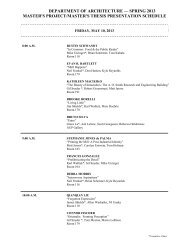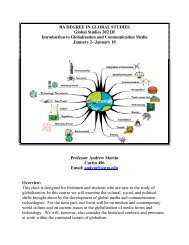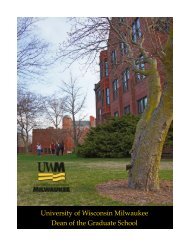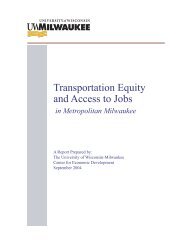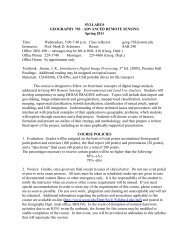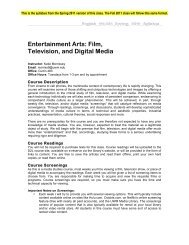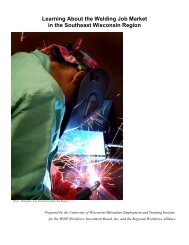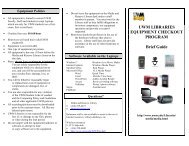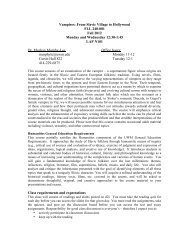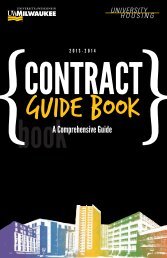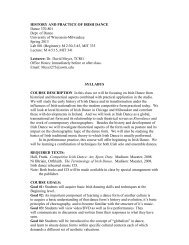FALL 2008 - UW-Milwaukee
FALL 2008 - UW-Milwaukee
FALL 2008 - UW-Milwaukee
You also want an ePaper? Increase the reach of your titles
YUMPU automatically turns print PDFs into web optimized ePapers that Google loves.
A D M I N I S T R A T O RP R O F I L EPatricia ArredondoBy Marla Hyder<strong>UW</strong>M’s associate vice chancellorfor Academic Affairs is a livinglegend. Literally. In 2004, theAmerican Counseling Associationconferred the title Living Legend uponPatricia Arredondo and just four otherpsychologists, each of whom helped laythe foundation for a different sphereof counseling research. The awardrecognized Arredondo’s seminal workin multicultural counseling, a relativelynew field that has gained increasingcredibility in large part due toArredondo’s contributions.These contributions have grownout of Arredondo’s passionate advocacyof cultural competency training formental health educators, researchers,and practitioners. According toArredondo, developing culturalcompetency means “thinking abouthow you see the world and how thatmight be fairly applied with otherindividuals in other settings.” It entails“understanding the worldviews of otherpersons, their values, their traditions,and looking at these as assets, not asliabilities.” Even though our countryhas come a long way, she says, manypeople still do not recognize theiruncon scious thoughts, practices, andsystems. Counselors must learn aboutother cultures and about white privilege,acculturation, and ethnic identity.Arredondo became aware ofcultural differences while growing upin a small industrial city in Ohio thatwas home to a large immigrant population.Though her own family hademigrated from Mexico, she foundherself surrounded primarily byEastern Europeans and Puerto Ricans.She reflects, “My interest in workingwith underrepresented groups startedin middle school and high school. Ibecame sensitized to cultural, color,class, and gender differences becauseI was going to school with mostly kidsof another ethnicity.”Another piece of the puzzle thatwould eventually become her careertook the form of a guidance counselorwho helped Arredondo prepare forcollege. Although she studied Spanishand Journalism at Kent State,Arredondo didn’t forget the influenceof that counselor. After teaching highschool Spanish for a few years, shedecided to pursue a Master’s inCounseling and work as a high schoolcounselor.Throughout her career, Arredondohas understood the importance ofmen toring and networking. She bene -fitted from both early on and has beenreturning the favor to students andjunior faculty ever since. It was a mentorwho suggested she pursue a doctoraldegree in counseling psych ology atBoston University. Arredondo says,“Sometimes mentoring is just a matterof asking, ‘How are you doing? Haveyou thought about a Master’s or PhD?’When someone else believes you havepromise to fulfill a doctoral program,that provides an empowering feeling.”Arredondo’s passion for mentoringextends beyond the academy. Whileteaching at Boston University, she “sawthat there were things we were teachingin graduate school that could be takento the workplace.” So in 1985, shefounded the organizational consultingcompany Empowerment Workshops,Inc. Despite some bumps along theroad — like having no one sign up forclasses on procrastination — Arredondobuilt a successful business that providedcontinuing education and organizationalassessments in such areas aswork force diversity, stress/time management,and gender issues in theworkplace.“I always pay attention to issues ofdiversity in the workplace,” she says.“It’s not an explicit part of my currentjob description, but everyone shouldbe paying attention to this.” Her jobdescriptions as associate vice chancellorfor Academic Affairs, interimdean for Continuing Education, andprofessor of Educational Psychologyinclude plenty of other responsibilities,however, from chairing the PlanningSupport Team for <strong>UW</strong>M’s Master Plan,to strengthening both research andaccess at <strong>UW</strong>M, to extending a <strong>UW</strong>Meducation to more working adults inthe <strong>Milwaukee</strong> community. On top ofall this, she maintains an active publicationschedule, handles numerousspeaking engagements including arecent keynote at the World PsychotherapyConference in Beijing, andserves on a number of boards. Inrecogni tion of all her con tri butions, shewas awarded an honorary doctoratefrom the University of San Diego in1998.Arredondo believes that all insti tutionshave structural, socio cultural,and interpersonal barriers that mayprevent individuals from advancingbecause they do not fit a certain prototype.“Do some role-taking,” she suggeststo those who do not face such barriers.“Consider what it would be like to cometo an institution or a class where youwere one of a few or the only studentof an under represented minority.Actively check out your assumptions andbiases about someone who is visiblydifferent from you. How might thosebiases and assumptions impact the wayyou work with that person? Check outboth your verbal and nonverbalcommunication, how you engagestudents, how you help them engagewith one another, and how you createa sense of community in a classroom.”Wise words from a living legend.18 Fall <strong>2008</strong>/Myriad



